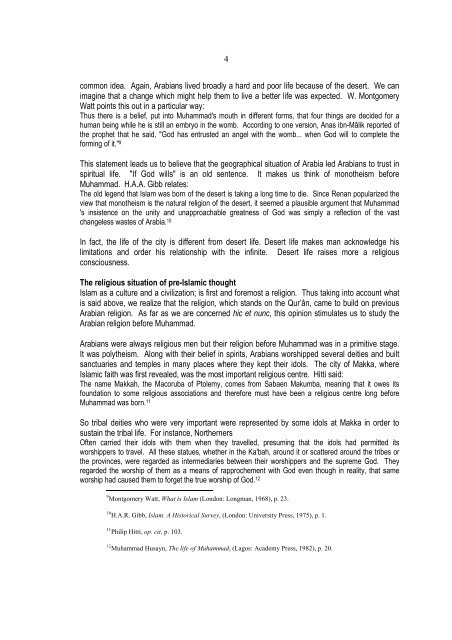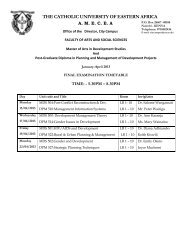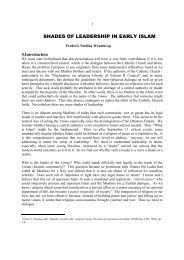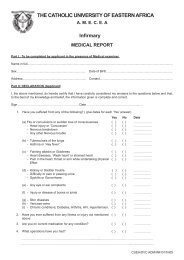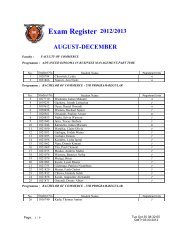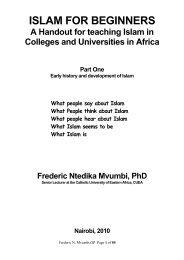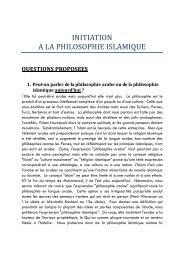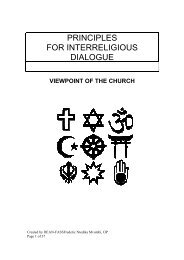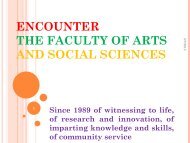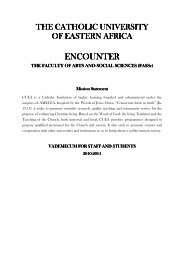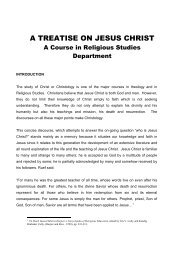INTRODUCTION TO ISLAMIC THEOLOGY.pdf - CUEA
INTRODUCTION TO ISLAMIC THEOLOGY.pdf - CUEA
INTRODUCTION TO ISLAMIC THEOLOGY.pdf - CUEA
Create successful ePaper yourself
Turn your PDF publications into a flip-book with our unique Google optimized e-Paper software.
4common idea. Again, Arabians lived broadly a hard and poor life because of the desert. We canimagine that a change which might help them to live a better life was expected. W. MontgomeryWatt points this out in a particular way:Thus there is a belief, put into Muhammad's mouth in different forms, that four things are decided for ahuman being while he is still an embryo in the womb. According to one version, Anas ibn-Mâlik reported ofthe prophet that he said, "God has entrusted an angel with the womb... when God will to complete theforming of it." 9This statement leads us to believe that the geographical situation of Arabia led Arabians to trust inspiritual life. "If God wills" is an old sentence. It makes us think of monotheism beforeMuhammad. H.A.A. Gibb relates:The old legend that Islam was born of the desert is taking a long time to die. Since Renan popularized theview that monotheism is the natural religion of the desert, it seemed a plausible argument that Muhammad's insistence on the unity and unapproachable greatness of God was simply a reflection of the vastchangeless wastes of Arabia. 10In fact, the life of the city is different from desert life. Desert life makes man acknowledge hislimitations and order his relationship with the infinite. Desert life raises more a religiousconsciousness.The religious situation of pre-Islamic thoughtIslam as a culture and a civilization; is first and foremost a religion. Thus taking into account whatis said above, we realize that the religion, which stands on the Qur’ân, came to build on previousArabian religion. As far as we are concerned hic et nunc, this opinion stimulates us to study theArabian religion before Muhammad.Arabians were always religious men but their religion before Muhammad was in a primitive stage.It was polytheism. Along with their belief in spirits, Arabians worshipped several deities and builtsanctuaries and temples in many places where they kept their idols. The city of Makka, whereIslamic faith was first revealed, was the most important religious centre. Hitti said:The name Makkah, the Macoruba of Ptolemy, comes from Sabaen Makumba, meaning that it owes itsfoundation to some religious associations and therefore must have been a religious centre long beforeMuhammad was born. 11So tribal deities who were very important were represented by some idols at Makka in order tosustain the tribal life. For instance, NorthernersOften carried their idols with them when they travelled, presuming that the idols had permitted itsworshippers to travel. All these statues, whether in the Ka'bah, around it or scattered around the tribes orthe provinces, were regarded as intermediaries between their worshippers and the supreme God. Theyregarded the worship of them as a means of rapprochement with God even though in reality, that sameworship had caused them to forget the true worship of God. 129 Montgomery Watt, What is Islam (London: Longman, 1968), p. 23.10 H.A.R. Gibb, Islam. A Historical Survey, (London: University Press, 1975), p. 1.11 Philip Hitti, op. cit, p. 103.12 Muhammad Husayn, The life of Muhammad, (Lagos: Academy Press, 1982), p. 20.


